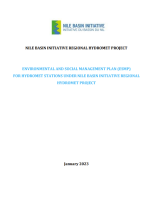Abstract
This is study on the ‘Evaluation of potential for water saving from improved irrigation efficiency in the Nile Basin’ was carried out by NBI Secretariat (Nile-SEC) and the Justus Liebig University Germany (JLU) under contract with the Gesellschaft für Internationale Zusammenarbeit’, GIZ. GIZ is supporting the NBI on behalf of the German Government since 2002. The German Government however has a very substantial portfolio of engagement in Nile riparian states in the water, energy and agricultural sectors on a bilateral basis both through GIZ and KfW. In 2014, the German Government, through the Foreign Office, has commissioned GIZ to undertake a review of some elements of German support to Nile Basin cooperation. This is to provide input to the further strategic development of support at the bilateral and regional level.
One of the tasks under this assignment is to assess whether increased investments in water use efficiency in the irrigated agricultural sector in the riparian countries can make a substantial contribution towards addressing the key challenges of cooperative water resources management in the basin, for example by increasing the availability of water resources in the basin through water savings. This assignment is deliberately designed to serve two purposes: (a) to inform the strategy development of the German government and (b) to make a contribution to further NBI’s agenda on agricultural water use in the basin and NBI’s capacities to provide policy inputs in this dimension.
The study was conducted during the period February– May 2015 based on published information on existing and planned future irrigation systems in the Nile Basin and modeling tools available at the two institutions, which carried out the study.




